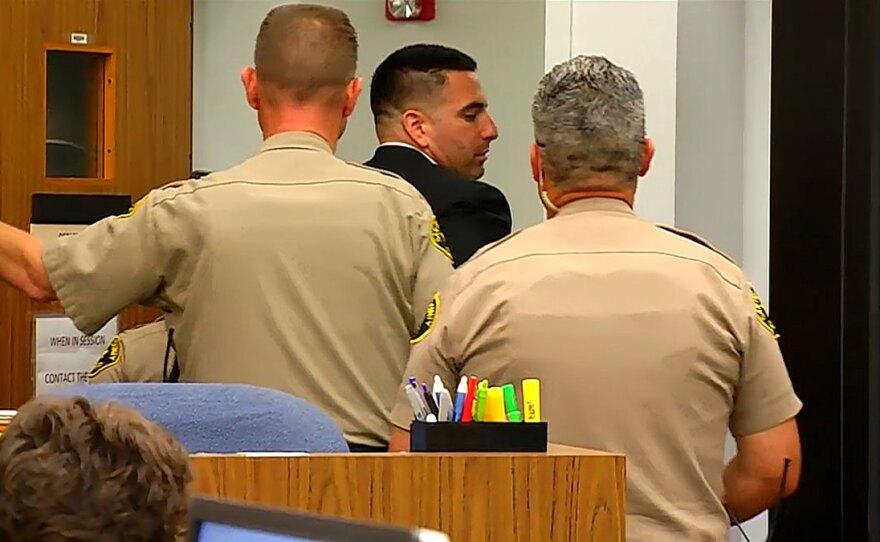A San Diego County sheriff's deputy charged with groping 13 women he encountered while on duty over a two-year period spoke publicly Thursday for the first time about the case against him, telling reporters the charges are false.
"These charges are simply untrue. I vigorously deny them," said Richard Fischer, who appeared in front of the San Diego Central Courthouse with his wife and his new attorney, Manny Medrano.
RELATED: Deputy Accused Of Groping Women While On Duty Ordered To Stand Trial
Fischer, 32, faces 14 years and eight months in prison if convicted of assault and battery by an officer, sexual battery and false imprisonment.
Fischer said the allegations that he groped and sexually assaulted women while on the job "runs against my DNA."
The deputy said he served eight years in the United States Marine Corps Reserve and was deployed to Afghanistan. Fischer said he has made more than 700 arrests during his time in law enforcement.
"It's not just a job, it's a calling," Fischer said of his work as a sheriff's deputy.
Fischer said he and his wife pray every night that his good name will be cleared.
"I'm innocent until proven guilty," Fischer told reporters. "Don't convict me on innuendo."
Nineteen women have filed lawsuits against Fischer in civil court, alleging that he assaulted them while on patrol.
RELATED: Another Woman Comes Forward In Sexual Misconduct Case Against Sheriff’s Deputy
Medrano said Fisher and his wife have been happily married for four years and are united as they fight through their "nightmare."
The attorney said the case boiled down to a "she said, he said," with no eyewitness, no confession from Fischer, and "significant" credibility problems with alleged victims.
Medrano said his team has started its own investigation into the criminal charges against Fischer, who is scheduled to be back in court Aug. 30.
Deputy District Attorney Annette Irving told Judge Daniel Goldstein at the end of a five-day preliminary hearing that Fischer "preyed" upon the alleged victims while on duty and in full uniform, mostly late at night.
"He had the authority to detain these women," the prosecutor said. "He had power over these women, who were all vulnerable. These women needed help, not sex."
Fischer asked the alleged victims for hugs, touched the breasts of some and moved the hand of one woman over his crotch while they hugged for a third time, according to Irving.
"She said, 'What are you doing!'" Irving told the judge. "He tells her, 'Don't tell anyone."'
RELATED: San Diego Sheriff’s Deputy Accusers Describe Sexual Misconduct Allegations
Fischer's attorney at the time, Richard Pinckard, questioned the credibility of many of the alleged victims and said many had felony convictions.
Pinckard and defense attorney Chris Kowalski previously argued that the women had consented to let Fischer hug them.
Kowalski said the hugging of one woman was not appropriate, "but is it criminal?"
"It doesn't look good, but it's not a crime," the attorney told the judge.
Goldstein ruled that enough evidence was produced during the hearing for Fischer to stand trial. The judge said the women were the victims of mental and psychological coercion. He said all of the alleged victims were down on their luck and fearful of reporting what happened to them. Goldstein said he didn't believe the women consented to Fischer hugging them.
"They couldn't adequately fight him off," the judge said.
Fischer surrendered to authorities in late February before his initial arraignment. He was placed on paid administrative leave when the first allegations against him came to light last October. The six-year veteran was removed from paid-leave status in January.






